Weekly Recap
Over the past week, the market digested several important data points from the US, which indicated a clear weakening of the labour market.
US non-farm payroll data revealed that only 22,000 jobs were created in August, significantly below the 75,000 new jobs expected and a decline from 79,000 in July. Meanwhile, a revision to June showed a loss of 13,000 jobs, the first negative month since 2021. Unemployment also ticked higher to 4.3%. The data cemented fed rate cut expectations, with the market fully pricing in a 25 basis points rate cut in September. In fact, the markets now see a 12% chance of the Fed cutting by an outsized 50 basis points. The markets are pricing in three rate cuts this year.
US stocks moved slowly higher across the week, with the S&P 500 reaching a fresh record high. The USD was unchanged across the week. Meanwhile, Gold rose to a fresh record high above 3500 towards 3600, boosted by rate cut expectations and worries over rising government debt levels across Western economies.
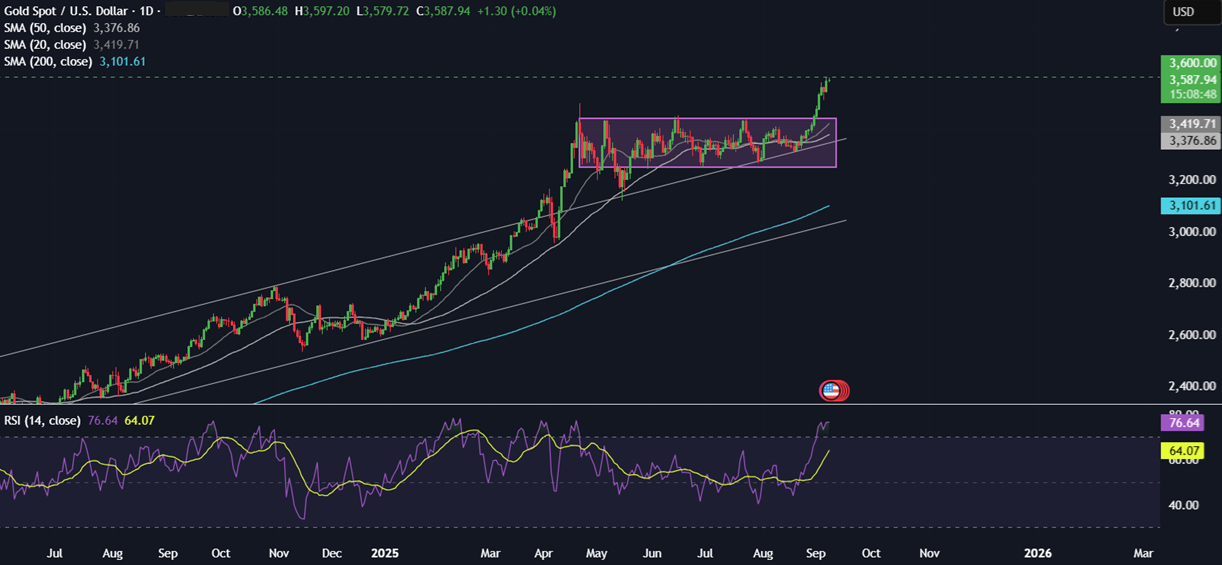
OPEC+ (Sunday)
Oil prices will be in Focus at the start of the week after OPEC+ agreed in principle to increase production in October. The group expects to approve adding 137,000 barrels a day in return for 1.66 million barrels a day of cuts, which were scheduled to remain in place until the end of 2026. The latest increase would be a significant pivot by OPEC after the group had done the old markets in recent months by reviving 2.2 million barrels of halted production in a bid to reclaim market share, despite widespread expectations of an impending surplus. Oil prices have fallen 12% this year, pressured by increased supply from OPEC, and as President Trump, who is always in demand.
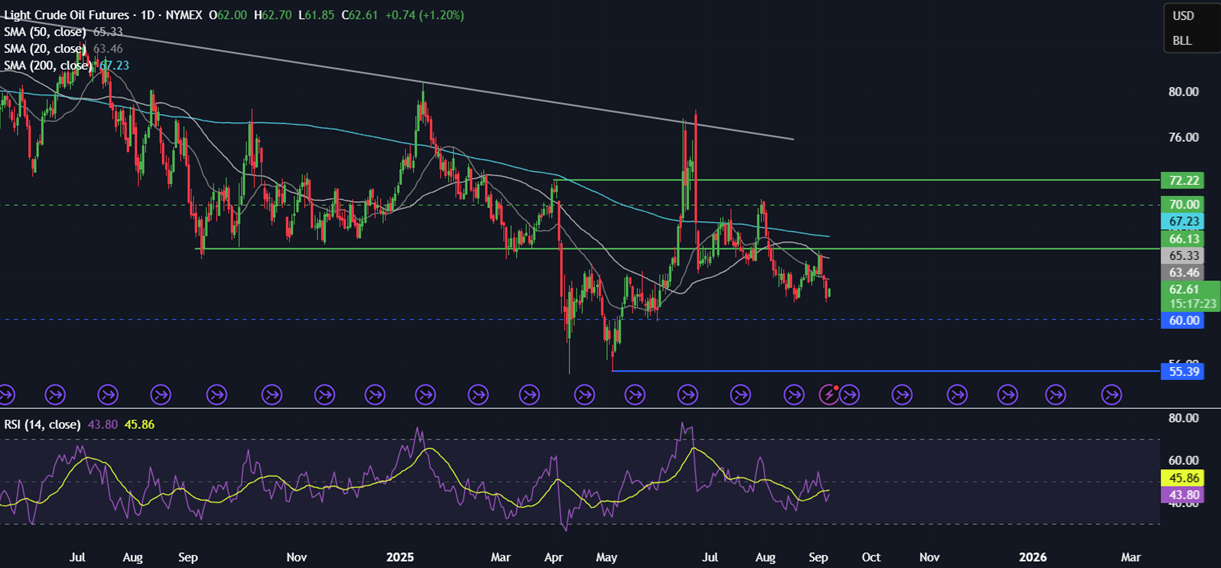
Japanese PM resigns (Sunday)
Japanese Prime Minister Shigeru Ishiba has announced his resignation after weeks of uncertainty following a second national election setback under the decision, which will put in motion a leadership race that could unnerve investors until a new leader is chosen. Further instability could weigh on both the yen and longer-dated bonds after yields on longer-term Japanese debt reached fresh multi-decade highs last week. PM Isiba was known for a strict stance on fiscal discipline. The markets will be nervous that his replacement may not follow such a rigorous path. The BoJ is likely to delay rate hiking plans until there is further clarity regarding the political position, pulling USD/JPY lower.
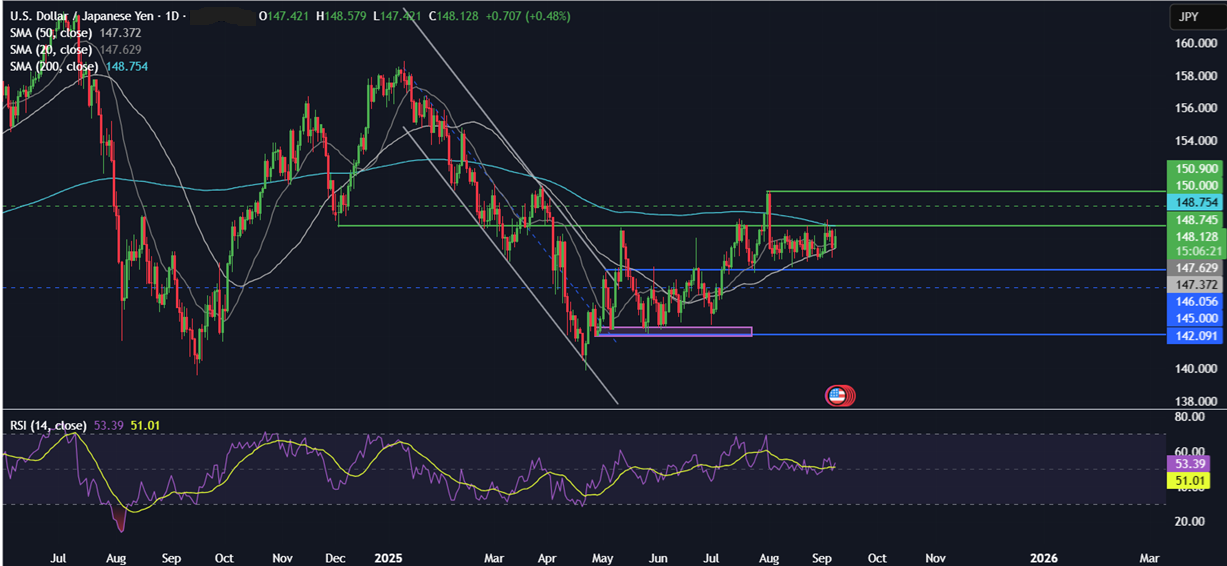
French vote of no-confidence (Monday)
French PM Bayrou will be subject to a vote of no confidence in relation to his fiscal plans on Monday and is widely expected to lose. This will give President Macron several options. Firstly, and preferably, he could appoint a new PM who would need to retain support from the central bloc and the left-wing parties. Should this option fail, Macron could call fresh elections; however, the fractured political landscape is not expected to change significantly, which leaves open the risk of a strong national rally showing. The outcome of the confidence vote is likely to be a continuation of the current political uncertainty, which could see the OAT-Bund 10-year yield spread widen further. Macron’s next PM candidate, and then Fitch ratings on Friday, will be key. Fitch currently has France at AA- . Any weakness could be portrayed through French assets such as the CAC.
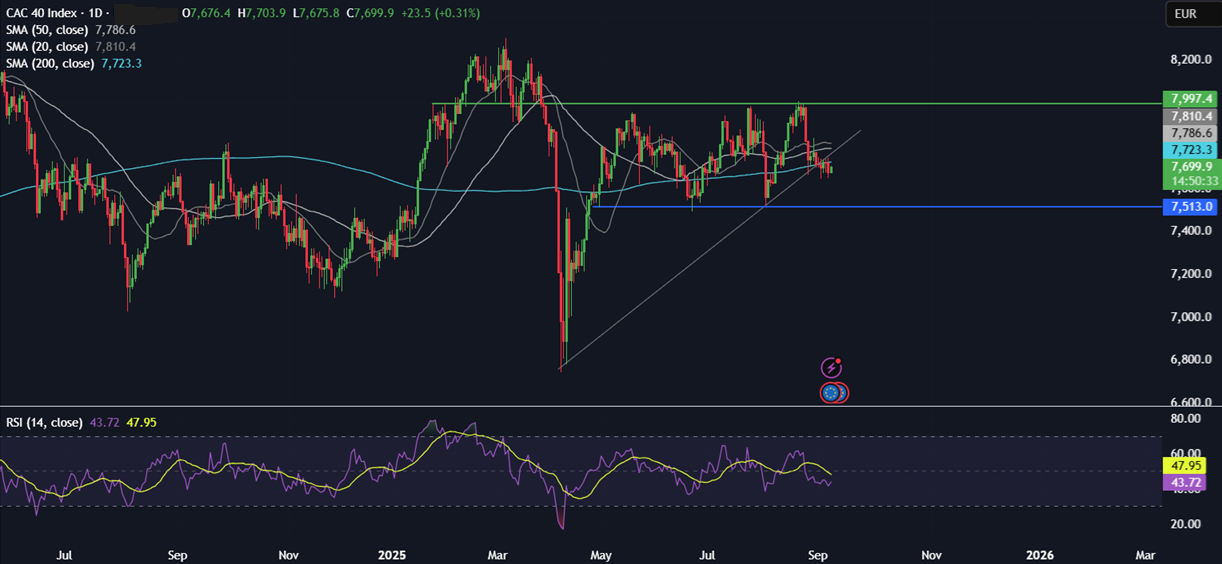
China CPI, PPI – Exports & Imports (Wednesday)
In July, China CPI showed inflation rose 0.0% just avoiding a return to negative territory. Core inflation, which excludes more volatile items such as food and fuel, rose 0.8% year on year, marking the highest level in 17 months. For August, economists expect inflation to fall 0.2% year on year, and core CPI is forecast to hold roughly steady at around 0.7%. Weak headline inflation is a sign that the Chinese economy continues to face deflationary pressures, indicating weak consumer and business activity. The threat of deflation, combined with slow demand amid external challenges from ongoing US-China trade tensions, suggests that more stimulus could be needed to boost economic momentum in the world’s second-largest economy. Chinese trade figures will also be in focus earlier in the week. Soft data could drag on Chinese stocks, including the Hang Seng.
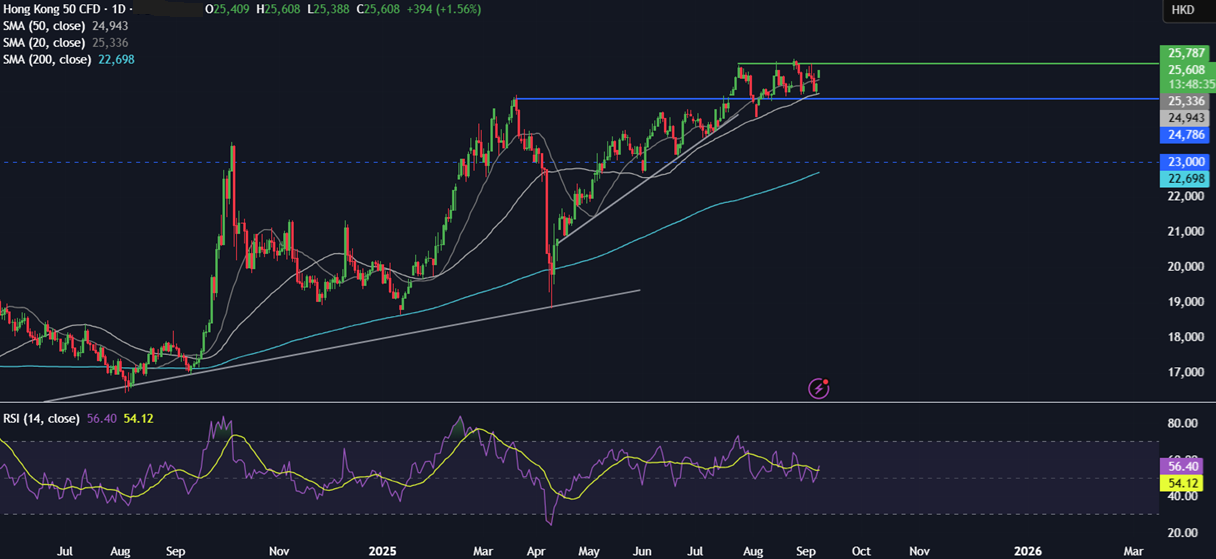
ECB rate decision (Thursday)
ECB is expected to leave interest rates unchanged at 2% in the September meeting for a second straight meeting as inflation continues to hover around the target 2% level. This gives the ECB the luxury of being able to wait and assess the impact of the US-EU trade agreement on the economy. Attention will be on the arguments presented by the doves and the hawks over whether the central bank should cut rates again. Some policymakers are concerned about inflation undershooting, and those worries have not disappeared since the last meeting in July. The Fed is potentially starting an aggressive series of rate cuts, which could lead to a further strengthening of the euro and increase the risk of inflation in the eurozone undershooting. While a rate cut in September is not expected, a rate cut later this year should not be ruled out. A dovish-sounding ECB could pull EUR/USD lower.
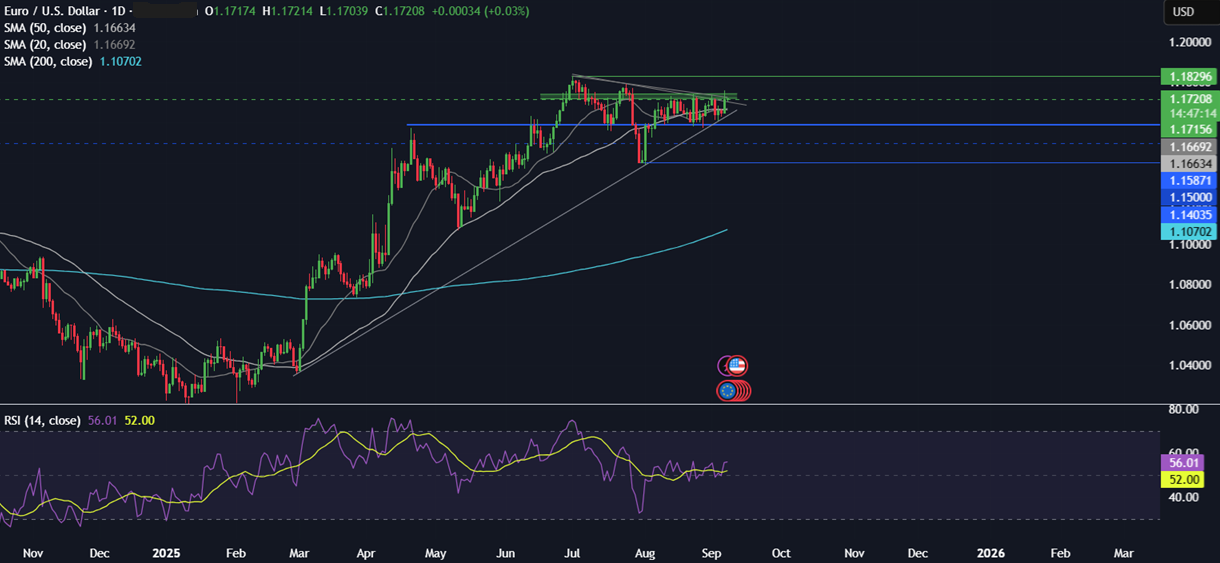
US CPI (Thursday)
In July, the headline CPI for the US rose 0.2% keeping the annual rate in line with forecasts of 2.7%. Core inflation rose by 0.3% on a monthly basis and 3.1% year over year. Economists expect headline inflation to tick up to 2.9% YoY, marking the highest level since January. The data comes as the Federal Reserve continues to watch inflation figures carefully amid expectations that Trump’s trade tariffs will add inflationary pressures to the economy. While Federal Reserve chair Jerome Powell acknowledged the upward risk to inflation in his Jackson Hole speech, he also noted that weakness and the jobs market may force the Fed to act. The market is fully pricing in a 25 basis point rate cut for the September 17 rate decision and sees two more 25 basis point rate cut before the end of the year. Hotter than expected inflation could see investors rein in slightly rate cut expectations, but is unlikely to affect rate cut expectations for this month materially; therefore, the impact on the USD and stock indices such as the Nasdaq could be limited.
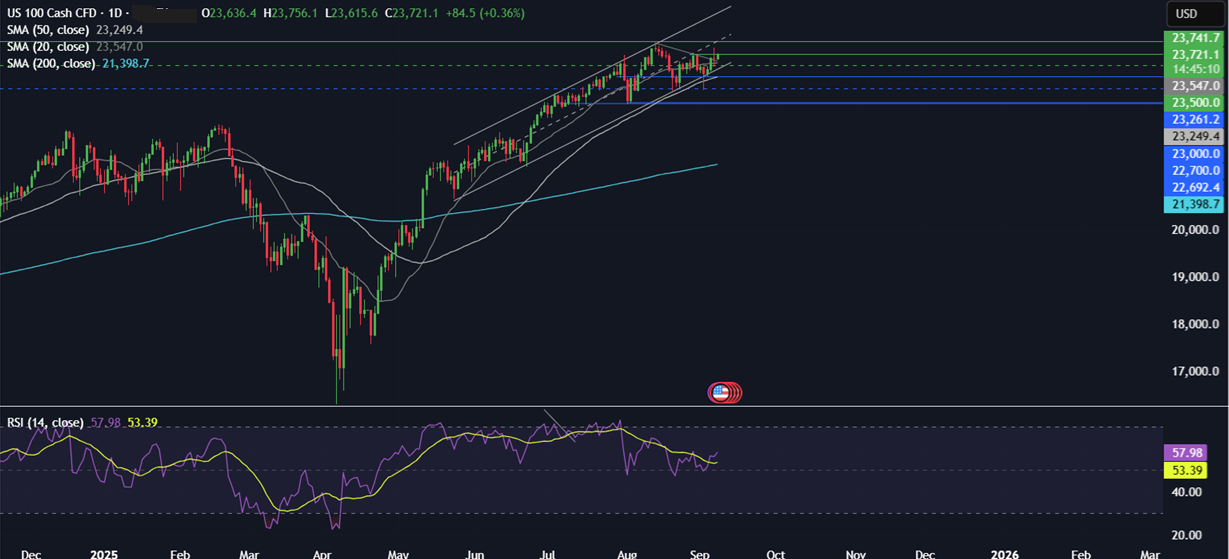
UK GDP (Friday)
The UK economy is expected to show expansion of 0.4% month on month in July, pointing to a strong start for growth in the third quarter. This comes after the economy expanded by 0.3% in Q2 and a rate of 0.4% in June on a monthly basis. Recent PMI data has also been encouraging, with the services sector expanding by more than expected. However, there are clouds on the horizon as caution starts to seep in ahead of the Chancellor’s budget in November. Furthermore, industry data shows some weakening in the labour market. A report closely watched by BoE policymakers showed that employer levels over the three months to August were 0.5% lower, amounting to the worst decline since 2021, as firms grapple with the government’s increased tax burden and rise in minimum wage measures that came into effect in April. Weaker-than-expected GDP data could weigh on GBP/USD.
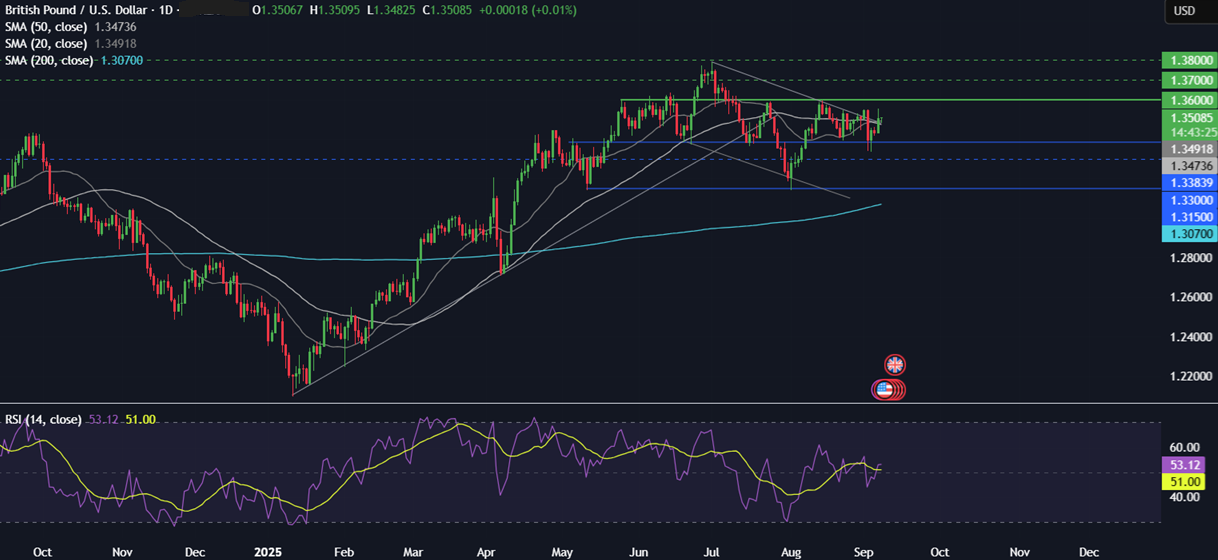
Trading involves risk.
The content provided here is for informational purposes only. It is not intended as personal investment advice and does not constitute a solicitation or invitation to engage in any financial transactions, investments, or related activities. Past performance is not a reliable indicator of future results.
The financial products offered by the Company are complex and come with a high risk of losing money rapidly due to leverage. These products may not be suitable for all investors. Before engaging, you should consider whether you understand how these leveraged products work and whether you can afford the high risk of losing your money.
The Company does not accept clients from the Restricted Jurisdictions as indicated in our website/ T&C. Some services or products may not be available in your jurisdiction.
The applicable legal entity and its respective products and services depend on the client’s country of residence and the entity with which the client has established a contractual relationship during registration.




